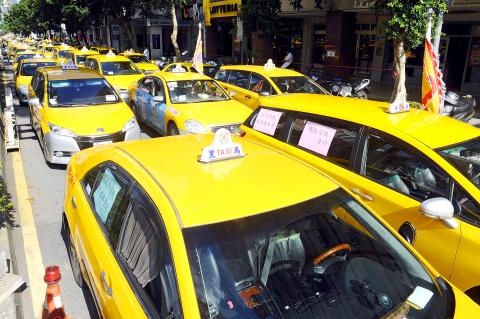Regulations on color requirements and pricing for taxis might be relaxed if a policy being considered by the Ministry of Transportation and Communications will go into effect in May amid the government’s ongoing tussle with Uber, the ministry said.
The ministry said it submitted a draft policy to the Executive Yuan last month after analyzing similar laws in Malaysia and Singapore.
If passed, taxis would be divided into normal and reserved, with normal taxis keeping their original yellow color scheme, the ministry said.

Photo: Chen Chih-chu, Taipei Times
Reserved taxi operators would be free to choose the color of their vehicles and illuminated taxi signs would not be required to be mounted on the roof or could be kept inside the car, the ministry said.
If the policy is approved, normal taxis could nearly double starting prices, the ministry said. For example, the starting price for a ride in Taipei would rise from NT$80 to NT$150.
Under the proposal, taxi operators would also be allowed to post different prices during peak and off-peak hours, but this option is to be predicated by whether a taxi can offer sufficient value in terms of car model, the ministry said, adding that vehicles would not necessarily have to be expensive Mercedes-Benzes or BMWs, but they should be relatively high-class models and not older than seven years.
The proposed scheme would also encourage taxi operators to upgrade to electronic payment methods, allowing customers to pay with credit cards before the journey and just get out at their destinations, the ministry said.
Operators with fleets of vehicles would be encouraged to design smartphone apps to allow passengers to know the model and color of the car that will pick them up, the ministry said.
The policy would offer consumers more choices and allow taxis to operate under a new management method, the ministry said, adding that it was still negotiating with taxi unions and consumer groups.

A Ministry of Foreign Affairs official yesterday said that a delegation that visited China for an APEC meeting did not receive any kind of treatment that downgraded Taiwan’s sovereignty. Department of International Organizations Director-General Jonathan Sun (孫儉元) said that he and a group of ministry officials visited Shenzhen, China, to attend the APEC Informal Senior Officials’ Meeting last month. The trip went “smoothly and safely” for all Taiwanese delegates, as the Chinese side arranged the trip in accordance with long-standing practices, Sun said at the ministry’s weekly briefing. The Taiwanese group did not encounter any political suppression, he said. Sun made the remarks when

The Taiwanese passport ranked 33rd in a global listing of passports by convenience this month, rising three places from last month’s ranking, but matching its position in January last year. The Henley Passport Index, an international ranking of passports by the number of designations its holder can travel to without a visa, showed that the Taiwan passport enables holders to travel to 139 countries and territories without a visa. Singapore’s passport was ranked the most powerful with visa-free access to 192 destinations out of 227, according to the index published on Tuesday by UK-based migration investment consultancy firm Henley and Partners. Japan’s and

BROAD AGREEMENT: The two are nearing a trade deal to reduce Taiwan’s tariff to 15% and a commitment for TSMC to build five more fabs, a ‘New York Times’ report said Taiwan and the US have reached a broad consensus on a trade deal, the Executive Yuan’s Office of Trade Negotiations said yesterday, after a report said that Washington is set to reduce Taiwan’s tariff rate to 15 percent. The New York Times on Monday reported that the two nations are nearing a trade deal to reduce Taiwan’s tariff rate to 15 percent and commit Taiwan Semiconductor Manufacturing Co (TSMC, 台積電) to building at least five more facilities in the US. “The agreement, which has been under negotiation for months, is being legally scrubbed and could be announced this month,” the paper said,

MIXED SOURCING: While Taiwan is expanding domestic production, it also sources munitions overseas, as some, like M855 rounds, are cheaper than locally made ones Taiwan and the US plan to jointly produce 155mm artillery shells, as the munition is in high demand due to the Ukraine-Russia war and should be useful in Taiwan’s self-defense, Armaments Bureau Director-General Lieutenant General Lin Wen-hsiang (林文祥) told lawmakers in Taipei yesterday. Lin was responding to questions about Taiwan’s partnership with allies in producing munitions at a meeting of the legislature’s Foreign Affairs and National Defense Committee. Given the intense demand for 155mm artillery shells in Ukraine’s defense against the Russian invasion, and in light of Taiwan’s own defensive needs, Taipei and Washington plan to jointly produce 155mm shells, said Lin,